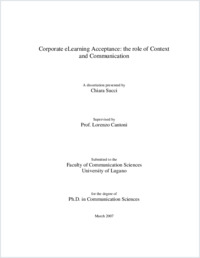Corporate eLearning acceptance : the role of context and communication
- Succi, Chiara
- Cantoni, Lorenzo (Degree supervisor)
-
23.05.2007
217
Thèse de doctorat: Università della Svizzera italiana, 2007 (jury note: Magna cum laude)
eLearning
acceptance
corporate learning
innovation
eLearning
accettazione
formazione professionale
innovazione
English
The fast integration of Information and Communication Technologies (ICTs) is showing its deep impact onto society in every aspect. Each new technology – and also eLearning – needs to be accepted and integrated in everyday practices. The problem of eLearning acceptance is confirmed by data about abandonment and dropouts of eLearning activities and its relevance emerges clearly in a context where knowledge is the key factor and where ICTs are in charge of sharing information and content (knowledge society). The hypothesis of this research is that context factors surrounding eLearning experiences affect participation and motivation; they can be managed in order to enhance the level of acceptance. In particular the communication of eLearning activities, among contextual elements, emerges to have an impact onto the acceptance of eLearners. The research aims at describing the conditions of eLearning acceptance, understanding the role of context and communication factors and providing a set of parameters to be considered when an eLearning activity is planned and proposed to eLearners. A blend of qualitative and quantitative methods has been chosen to achieve the goals of the research and build an eLearning Acceptance Index. Key factors have been identified through a comprehensive analysis of the literature on the acceptance issue. Theories and models are presented focusing on phases and variables of the acceptance process and highlighting the importance of contextual factors. A general framework of analysis for the implementation of eLearning activities in organisations is built and presented in the Map of eLearning Acceptance (MeLA). The second part of the research operates a focus on MeLA considering only organizational context variables that affect mainly the preparation phase of the eLearning Acceptance process. The list of variables obtained with this operation has been refined, described, assessed, divided and organized through nine case studies and two surveys. This research has made a step forward in the comprehension and solution of the problem of eLearning acceptance. In particular, the Map of eLearning Acceptance and the eLearning Acceptance Index represent two original instruments that eLearning researchers and practitioners can use. Companies seem to be familiar with tools and strategies to enhance eLearning Acceptance but they lack of a farseeing approach. They are rather focused on solving short term issues than building an eLearning culture and a comprehensive environment. Communication channels are well exploited to deliver information but seem to lack when it comes to involve and motivate eLearners.
- Language
-
- English
- Classification
- Education, teaching
- License
-
License undefined
- Identifiers
-
- RERO DOC 7973
- URN urn:nbn:ch:rero-006-108321
- ARK ark:/12658/srd1318074
- Persistent URL
- https://n2t.net/ark:/12658/srd1318074
Statistics
Document views: 382
File downloads:
- Texte intégral: 273
